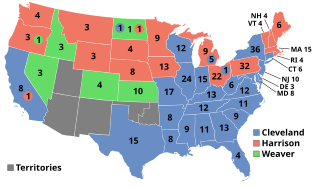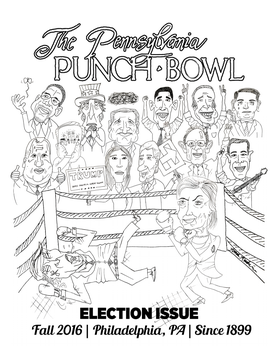Related Research Articles

The University of Pennsylvania is a private Ivy League research university in Philadelphia. It is the fourth-oldest institution of higher education in the United States and one of the most prestigious in the world. While the university dates its founding to 1740, it was created by Benjamin Franklin and other Philadelphia citizens in 1749.

The 1888 United States presidential election was the 26th quadrennial presidential election, held on Tuesday, November 6, 1888. Republican nominee Benjamin Harrison, a former Senator from Indiana, defeated incumbent Democratic President Grover Cleveland of New York. It was the third of five U.S. presidential elections in which the winner did not win the national popular vote, which would not occur again until the 2000 US presidential election.

The 1892 United States presidential election was the 27th quadrennial presidential election, held on Tuesday, November 8, 1892. In a rematch of the closely contested 1888 presidential election, former Democratic President Grover Cleveland defeated incumbent Republican President Benjamin Harrison. Cleveland's victory made him the first and, to date, the only person in American history to be elected to a non-consecutive second presidential term. It was also the first time incumbents were defeated in consecutive elections—the second being Jimmy Carter's defeat of Gerald Ford in 1976, followed by Carter's subsequent loss to Ronald Reagan in 1980.

Theodore Herman Albert Dreiser was an American novelist and journalist of the naturalist school. His novels often featured main characters who succeeded at their objectives despite a lack of a firm moral code, and literary situations that more closely resemble studies of nature than tales of choice and agency. Dreiser's best known novels include Sister Carrie (1900) and An American Tragedy (1925).

Nelson Wilmarth Aldrich was a prominent American politician and a leader of the Republican Party in the United States Senate, where he represented Rhode Island from 1881 to 1911. By the 1890s, he was one of the "Big Four" key Republicans who largely controlled the major decisions of the Senate, along with Orville H. Platt, William B. Allison, and John Coit Spooner. Because of his impact on national politics and central position on the pivotal Senate Finance Committee, he was referred to by the press and public alike as the "general manager of the Nation", dominating tariff and monetary policy in the first decade of the 20th century.

Matthew Stanley Quay was an American politician of the Republican Party who represented Pennsylvania in the United States Senate from 1887 until 1899 and from 1901 until his death in 1904. Quay's control of the Pennsylvania Republican political machine made him one of the most powerful and influential politicians in the country, and he ruled Pennsylvania politics for almost twenty years. As chair of the Republican National Committee and thus party campaign manager, he helped elect Benjamin Harrison as president in 1888 despite his not winning the popular vote. He was also instrumental in the 1900 election of Theodore Roosevelt as vice president.

Fredrick Malcolm Waring Sr. was an American musician, bandleader, and radio and television personality, sometimes referred to as "America's Singing Master" and "The Man Who Taught America How to Sing". He was also a promoter, financial backer and eponym of the Waring Blendor, the first modern electric blender on the market.

Samuel Jackson Randall was an American politician from Pennsylvania who represented the Queen Village, Society Hill, and Northern Liberties neighborhoods of Philadelphia from 1863 to 1890 and served as the 29th speaker of the United States House of Representatives from 1876 to 1881. He was a contender for the Democratic Party nomination for President of the United States in 1880 and 1884.
H. Bruce Franklin is an American cultural historian and scholar. He is notable for receiving top awards for his lifetime scholarship in fields as diverse as American studies, science fiction, prison literature and marine ecology. He has written or edited twenty books and three hundred professional articles and participated in making four films. His main areas of academic focus are science fiction, prison literature, environmentalism, the Vietnam War and its aftermath, and American cultural history. He was instrumental in helping to debunk false public speculation that Vietnam was continuing to hold prisoners of war. He helped to establish science fiction writing as a genre worthy of serious academic study. In 2008, the American Studies Association awarded him the Pearson-Bode Prize for Lifetime Achievement in American Studies.

Milton Jerrold Shapp was an American businessman and politician who served as the 40th governor of Pennsylvania from 1971 to 1979 and the first Jewish governor of Pennsylvania. He was also the first governor of Pennsylvania to be eligible for, and re-elected to, consecutive four-year terms per the 1968 Pennsylvania Constitution.

The Pennsylvania Punch Bowl, also known colloquially as the Punch Bowl, is a humor magazine published by students at the University of Pennsylvania. The magazine was founded in 1899.

The Annenberg School for Communication is the communication school at the University of Pennsylvania. The school was established in 1958 by Wharton School alum Walter Annenberg as the Annenberg School of Communications. The name was changed to its current title in 1990.

Richie Unterberger is an American author and journalist whose focus is popular music and travel writing.
Richard Patrick McCormick was a historian, former university professor of history, administrator, professor emeritus at Rutgers University in New Brunswick, New Jersey, and president of the New Jersey Historical Society. McCormick was internationally recognized for his expertise in New Jersey and early American political history.
The 1880 Democratic National Convention was held June 22 to 24, 1880, at the Music Hall in Cincinnati, Ohio, and nominated Winfield S. Hancock of Pennsylvania for president and William H. English of Indiana for vice president in the United States presidential election of 1880.
Roy Franklin Nichols was an American historian, who won the 1949 Pulitzer Prize for History for The Disruption of American Democracy.
Dan Ben-Amos is a folklorist and professor at the University of Pennsylvania, Philadelphia, where he holds the Graduate Program Chair for the Department of Folklore and Folklife.
John T. Cunningham was an American journalist, writer, and historian who published numerous works related to the history of his native state, New Jersey. Long known as "New Jersey’s popular historian", his This is New Jersey, originally published in 1953, has never gone out of print. Cunningham work has also included collaboration on several documentaries and frequent speaking engagements.
Robert N. Burr was an American historian. He was a professor of history at the University of California, Los Angeles (UCLA) from 1948 to 1987, where he established the Latin American Studies program and served as its chair department from 1973 to 1977. He was the author of four widely reviewed books about Latin America and the recipient of scholarly awards.

Julian Lane Moynahan was an American academic, librarian, literary critic, poet, and novelist. Much of Moynahan's academic work was focussed on D. H. Lawrence and Vladimir Nabokov. He was active as a book reviewer for leading publications on both sides of the Atlantic and was awarded a Guggenheim Fellowship in 1983.
References
- ↑ "S walter Poulshock" . Retrieved December 21, 2020.
- ↑ Poulshock, S. Walter (1962). "Pennsylvania and the Politics of the Tariff, 1880-1888". Pennsylvania History. 29 (3). Retrieved 5 January 2016.
- ↑ Poulshock, S. Walter (1965). The two parties and the tariff in the 1880s. Syracuse University Press . Retrieved 5 January 2016.
- 1 2 3 4 5 Sternstein, Jerome. "Historical Fraud and the Seduction of Ideas: The Poulshock Case". History News Network. Retrieved 5 January 2016.
- 1 2 Arbagi, Martin. "News from Old Friends (in RSAS Graduate Newsletter, 2015)". Rutgers University . Retrieved 5 January 2016.
Many of the first generation [of PhD students] also remember the Poulshock scandal...Professor Poulshock was fired immediately. (At least one faculty member, we heard through the rumor mill, wanted him to stay on to the end of the semester so he could leave quietly during the summer, but that proposal was overridden.)
- 1 2 Yusem, Liz (1966). "Honor in the Ivory Tower?". The Daily Pennsylvanian . University of Pennsylvania . Retrieved 5 January 2016.
- ↑ "Explanation Needed (editorial)". The Daily Pennsylvanian . University of Pennsylvania. 1966. Retrieved 5 January 2016.
- ↑ Sternstein, Jerome (2002). "Are Michael Bellesiles's Critics Afraid to Say What They Really Think?". History News Network. Retrieved 5 January 2016.
- ↑ "Historical News". The American Historical Review. July 1966. doi:10.1086/ahr/71.4.1536.
- ↑ Luker, Ralph. "The Year When We Got Caught". History News Network. Retrieved 5 January 2016.
- ↑ Margolies, Daniel S. (2006). Henry Watterson and the new South the politics of empire, free trade, and globalization. Lexington, Ky.: University Press of Kentucky. p. 317. ISBN 9780813138527 . Retrieved 5 January 2016.
- ↑ Farrar-Myers, Victoria A. (2007). Scripted for change: the institutionalization of the American presidency (1st ed.). College Station: Texas A & M University Press. p. 252. ISBN 9781603444637 . Retrieved 5 January 2016.
- ↑ Sachsman, David; Bulla, David (2013). Sensationalism murder, mayhem, mudslinging, scandals, and disasters in. [S.l.]: Transaction. p. 144. ISBN 9781412851138 . Retrieved 5 January 2016.
- ↑ Skocpol, Theda (1995). Protecting soldiers and mothers the political origins of social policy in the United States. Cambridge, Mass.: Belknap Press of Harvard University Press. p. 581. ISBN 9780674043725 . Retrieved 6 January 2016.
- ↑ Gregory J. Dehler (2007). Chester Alan Arthur: The Life of a Gilded Age Politician and President. Nova Publishers. p. 49. ISBN 978-1-60021-079-2.
- ↑ "Obituaries". University of Pennsylvania . Retrieved 5 January 2016.